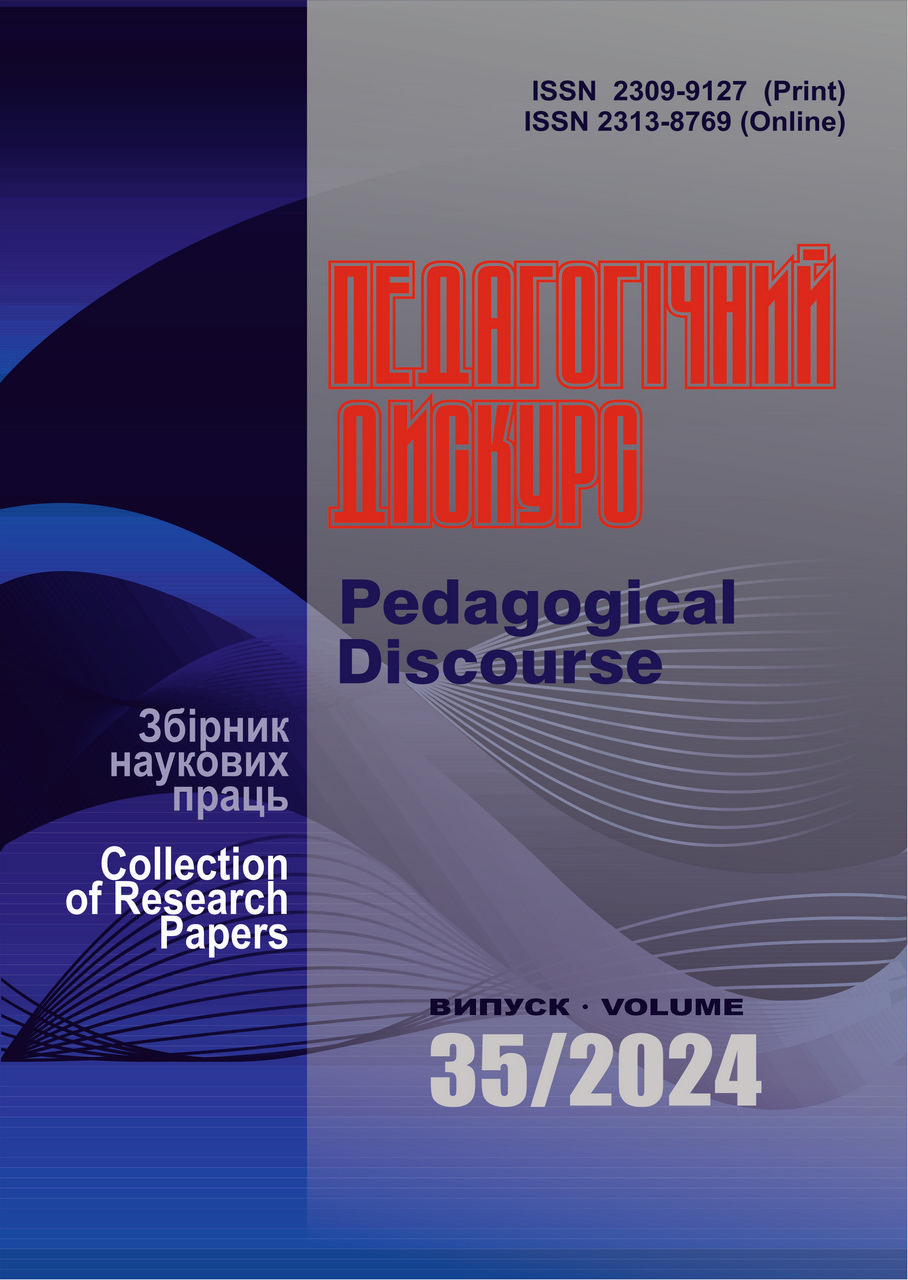Structural and Functional Model of Forming the Readiness of Future Special Forces Specialists for Professional Activity
Abstract
The article highlights the importance of training military specialists in the modern conditions of the functioning of the Armed Forces of Ukraine. The legislation of Ukraine on the transformation of military education and NATO training standards proves that the training of cadets in higher military educational institutions requires modernization and innovative approaches to conducting the educational process. An analysis of the educational training of future officers abroad, whose training experience is being introduced into the professionalization of military education in Ukraine to form the compatibility of the Armed Forces of Ukraine and the armed forces of NATO member states, was conducted. The basic requirements for the professional training of cadets were identified and the dependence of the new level of training on innovative educational innovations and the proper functioning of higher military educational institutions in a mixed form of education was noted. To predict the innovative educational process of training a bachelor of military management in the speciality 253 Military Management (by type of armed forces) and study it more holistically, pedagogical modelling was used as a method of researching objects of scientific knowledge. Within the framework of the process of systematic research of the formation of readiness of future special-purpose specialists for professional activity in conditions of mixed education, a structural-functional model was chosen. It is determined that the basis for building the model is scientific innovative paradigmatic approaches (systemic, competency-based, personality-oriented, creative, anthropological, cultural, sociological, informational and technological) and general pedagogical and specific principles that serve as defining guidelines in achieving the quality of professional training. The content of each of the structural blocks (targeted, theoretical, content, functional-methodical and result-based-evaluation) is characterized, which reveals the fundamental aspects of the formation of the readiness of special-purpose specialists for future activities.
Downloads
References
Бігич, О. Б. (2014). Сучасний студент у контексті особистісно-діяльнісного підходу: за результатами науково-методичних досліджень. Київ: Вид. центр КНЛУ. [in Ukrainian]
Бойко, О. (2017). Ціннісна концепція формування лідерської компетентності майбутніх офіцерів Збройних Сил України у ВВНЗ. Військова освіта, 2 (36), 7–18. [in Ukrainian]
Вітер, Д., & Красота-Мороз, Г. (2022). Принципи та підходи до підготовки підрозділів сил спеціальних операцій в Україні: основні тенденції та проблеми. Військова освіта, 2 (46), 40–48. [in Ukrainian]
Горбатюк, Р. М., & Білан, Н. М. (2018). Формування іншомовної компетентності майбутніх інженерів-енергетиків. Сучасні інформаційні технології та інноваційні методики навчання у підготовці фахівців: методологія, теорія, досвід, проблеми, 52, 272–276. [in Ukrainian]
Лодатко, Є. О. (2010). Моделювання педагогічних систем і процесів. (Монографія). Слов’янськ: СДПУ. [in Ukrainian]
Манохіна, І. В. (2015). Проблема професійної підготовки фахівців соціально-педагогічної сфери у науковій літературі. Вісник Дніпропетровського університету імені Альфреда Нобеля. Серія: педагогіка і психологія, 1, 128–134. [in Ukrainian]
Марчук, А. А. (2020). Особливості педагогічної взаємодії викладача та студента засобом змішаного навчання. Інноваційна педагогіка, 21 (3), 173–179. [in Ukrainian]
Мирончук, Н. М. (2016). Самоорганізаційні уміння як змістові конструкти професійних компетентностей майбутніх викладачів. В: Zbiόr artykułόw naukowych. Konferencji Miedzynarodowej Naukowo-Praktycznej «Pedagogika. Priorytetowe obszary 19 badawcze: od teorii do praktyki» (Lublin, 30.05.2016 – 31.05.2016). (s. 85–87). Warszawa: Wydawca: Sp. z o.o. «Diamond trading tour». [in Ukrainian]
Невальонний, Є. О. (2018). Рефлексія керівника в системі військового управління. Наукова дискусія: питання педагогіки та психології. Матеріали міжнар. наук.-практ. конф. (Київ, 30 лист. – 1 груд. 2018 р.). Ч. 2. (с. 106–108). Київ: ГО «Київська наукова організація педагогіки та психології». [in Ukrainian]
Пенцак, П. (2021). Напрями й особливості формування громадянсько-патріотичної позиції майбутніх офіцерів. Актуальнi питання гуманiтарних наук, 37 (2), 296–301. [in Ukrainian]
Про внесення змін до деяких законів України щодо Сил спеціальних операцій Збройних Сил України. (2020). Закон України від 17.09.2020. № 912-IX із змінами, внесеними згідно із Законом. Взято з: https://zakon.rada.gov.ua/laws/show/1437-19#n15 [in Ukrainian]
Про рішення Ради національної безпеки і оборони України від 20 серпня 2021 року «Про Стратегічний оборонний бюлетень України». (2021). Указ Президента України № 473/2021. Взято з: https://www.president.gov.ua/documents/4732021-40121 [in Ukrainian]
Столярова, О., Сафін, О., Діхтяренко, С., & Рабодзей, Т. (2022). Мотиваційна готовність здобувачів вищої освіти до майбутньої професії психолога. Вісник Національного університету оборони України, 64 (6), 105–109. [in Ukrainian]
Цюняк, O. П., & Розлуцька, Г. М. (2021). Змішане навчання як інноваційна форма організації освітнього процесу у закладах вищої освіти. Науковий вісник Ужгородського університету. Серія: Педагогіка. Соціальна робота, 2 (49), 232–235. [in Ukrainian]
Шапран, О., & Махно, Є. (2023). Аналіз процесів інтелектуалізації системи дистанційного навчання у Збройних силах України. Сучасні інформаційні технології у сфері безпеки та оборони, 46 (1), 107–114. [in Ukrainian]
Professional Military Education. A Cross-Cultural Survey. (2019). Ed. by Duraid Jalili and Hubert Annen. Berlin, Bern, Bruxelles, New York, Oxford, Warszawa, Wien. [in English]
Waggener, A. (2015). Joint Professional Military Education. A Retrospective of the Skelton Panel. JFQ 77, 2nd Quarter, 55‒59. [in English]
Copyright (c) 2024 Pedagogical Discourse

This work is licensed under a Creative Commons Attribution-NonCommercial-ShareAlike 4.0 International License.

















